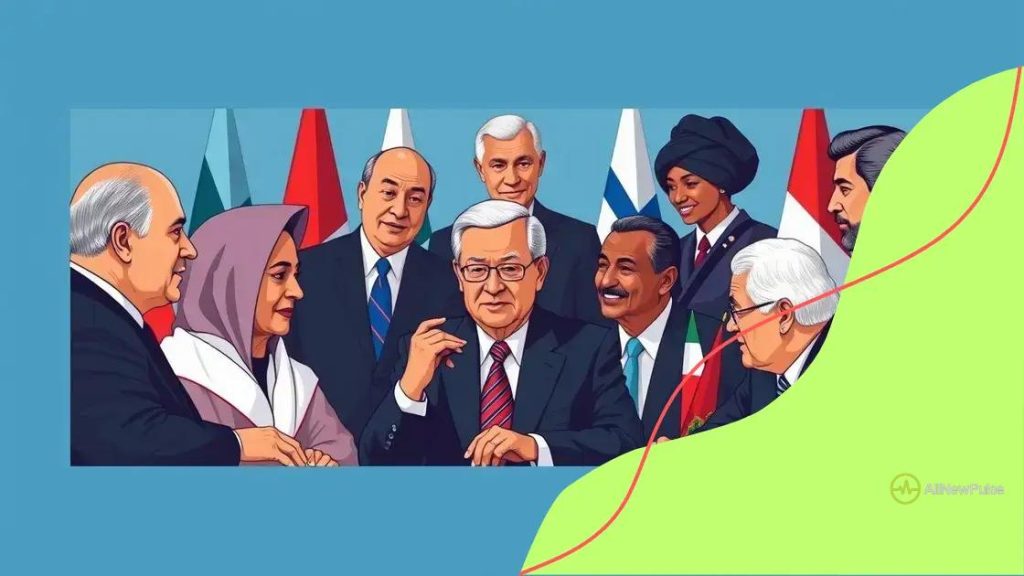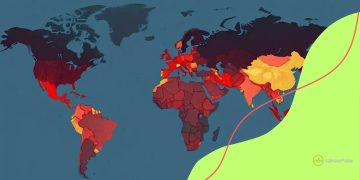The role of international organizations in global affairs

The role of international organizations in global affairs is crucial for promoting cooperation, addressing global challenges, and fostering diplomacy among nations to achieve common goals.
The role of international organizations in global affairs is crucial for fostering cooperation among nations. Have you ever wondered how these entities influence global peace and security? Let’s dive into their importance.
Understanding international organizations
Understanding international organizations is key to comprehending today’s world affairs. These entities play significant roles in promoting peace, stability, and cooperation among countries.
What are International Organizations?
International organizations can be defined as formal entities with members from multiple nations aimed at pursuing common objectives. They can be categorized into two main types: intergovernmental organizations (IGOs), such as the United Nations, and non-governmental organizations (NGOs), like the Red Cross.
Roles of International Organizations
These organizations engage in various activities that benefit global society:
- Facilitating diplomatic relations
- Promoting human rights and social development
- Coordinating international responses to crises
- Setting international standards and norms
By fulfilling these roles, international organizations help shape policies that govern how nations interact. For example, when countries face humanitarian crises, it is often these organizations that provide crucial assistance and support.
Moreover, many organizations focus on specific issues, such as health, environment, or trade. Their expertise allows for targeted strategies that address pressing global challenges.
Importance of Membership
Membership in international organizations provides countries with a platform to voice their concerns and influence global decisions. This representation is especially vital for smaller nations that may lack the resources to make their issues heard independently.
Furthermore, the collaborative nature of these organizations fosters a sense of community among nations, promoting solutions that respect diverse perspectives and cultures. Through various programs and initiatives, countries can work together towards shared goals, creating a more stable and equitable world.
Key players in global governance
In the realm of global governance, understanding the key players is essential for grasping how international decisions are made. These players include various states, organizations, and influential individuals who shape global policies.
Major States
Countries such as the United States, China, and members of the European Union often lead in international negotiations. Their political and economic power allows them to sway discussions and set agendas. The influence of these major states is felt in many issues, from climate change to trade agreements.
International Organizations
Organizations like the United Nations and the World Trade Organization (WTO) play pivotal roles in governance. The UN works to maintain peace and security, while the WTO regulates international trade. These organizations provide platforms for dialogue and cooperation among nations.
Influential Individuals
Prominent leaders, diplomats, and activists also contribute significantly to global governance. Individuals like Kofi Annan, former UN Secretary-General, have left lasting impacts through their leadership. These figures often champion critical issues and drive initiatives for change.
The Role of NGOs
Non-governmental organizations (NGOs) also play a crucial role in shaping global policies. They often highlight social issues and advocate for human rights, influencing both public opinion and governmental actions. NGOs provide grassroots perspectives that are essential for effective governance.
Through the combined efforts of these players, global governance strives to address challenges like poverty, conflict, and environmental degradation. The coordination among these entities is vital for creating sustainable solutions that benefit all nations.
The impact of international treaties

The impact of international treaties is profound and far-reaching. These agreements between countries shape the way nations interact and cooperate on various issues.
Defining International Treaties
International treaties are formal agreements that bind countries to specific obligations. They cover various areas, including trade, environmental protection, and human rights. These treaties provide a legal framework that countries must follow, ensuring accountability.
Benefits of International Treaties
These agreements offer numerous advantages:
- Promoting peace and security among nations
- Facilitating trade and economic cooperation
- Encouraging the protection of human rights
- Addressing global challenges such as climate change
Through treaties, countries can establish clear guidelines for behavior, reducing the risk of conflict. For instance, trade treaties allow countries to negotiate tariffs and quotas, enhancing economic partnerships.
Challenges in Treaty Implementation
Despite their benefits, implementing international treaties can be complex. Countries may have different interpretations of treaty obligations, leading to disputes. Additionally, political changes can impact a country’s commitment to existing treaties.
For instance, the Paris Agreement on climate change relies heavily on cooperation from its signatories. If a nation chooses to withdraw, it can weaken the overall efforts to combat climate change. The challenge lies in ensuring that countries adhere to their commitments while also adapting to their national interests.
Public awareness and participation are also crucial for the effectiveness of treaties. When citizens understand the importance of these agreements, they are more likely to advocate for compliance and accountability.
Challenges faced by organizations
International organizations face numerous challenges in their efforts to promote cooperation and meet global needs. These challenges can significantly impact their effectiveness and mission.
Political Pressure
One major challenge is political pressure from member states. Countries may prioritize national interests over global goals, making it difficult for organizations to reach consensus. This pressure can influence decisions and limit the organization’s ability to act swiftly.
Funding Issues
Financial constraints often hinder the operations of organizations. Many depend on voluntary contributions from member states. When countries reduce their funding, it limits programs and can lead to project delays. A lack of sufficient funding can also affect the ability to tackle urgent crises.
Geopolitical Tensions
Geopolitical tensions among member states can pose significant obstacles. Conflicts may arise from competing interests, leading to stalemates in negotiations. These situations can stall important initiatives and create divisions among nations, impacting the organization’s credibility.
For instance, when nations with divergent views on global security situations face off, it can prevent united actions or resolutions, thereby undermining the organization’s role in maintaining peace.
Addressing Global Inequities
International organizations must also address global inequities, such as disparities in wealth and resources. Developing nations often struggle to have their voices heard in decision-making processes. This inequity can result in policies that favor more powerful countries, leading to feelings of discontent and underrepresentation.
To overcome these challenges, organizations need to find ways to enhance dialogue and foster understanding between member states. Engaging diverse stakeholders can also create more inclusive solutions that address the needs of all nations.
Future of international cooperation
The future of international cooperation holds significant promise as global challenges become more pressing. Countries increasingly recognize the need to work together to address issues like climate change, pandemics, and security threats.
Emerging Collaborative Frameworks
New frameworks for collaboration are being established, allowing nations to tackle issues more effectively. These include regional agreements and partnerships that focus on specific problems. For example, countries in the European Union often collaborate closely on environmental policies to achieve common goals.
Technology and Global Networks
Advancements in technology play a crucial role in enhancing cooperation. Digital communication tools allow for real-time collaboration and information sharing among nations. This connectivity enables faster responses to crises, facilitating joint efforts to address urgent global issues.
Furthermore, online platforms provide opportunities for dialogue that may not occur face-to-face. This potential for increased engagement can foster understanding and reduce tensions between countries.
Inclusivity in Decision-Making
The movement towards inclusivity in international decision-making is also shaping the future of cooperation. There is a growing demand for diverse voices to be heard, particularly from developing countries. By ensuring that all nations have a say, the effectiveness and legitimacy of international agreements can be strengthened.
Youth involvement is another vital factor. Young leaders and activists are advocating for change, bringing new perspectives and energy to global discussions. Their engagement in international affairs fosters a sense of shared responsibility and motivates governments to act.
Challenges Ahead
Despite the positive trends, challenges remain. Geopolitical rivalries can hinder progress, and countries may still prioritize national interests over global collaboration. To navigate these tensions, nations must commit to dialogue and find common ground to develop effective solutions.
Investment in education and awareness-raising about global issues is essential to promote understanding. As societies recognize the interconnectedness of these challenges, the foundation for future cooperation will become stronger.
FAQ – Frequently Asked Questions about International Cooperation
What is international cooperation?
International cooperation refers to the collaboration between countries to address global challenges and achieve common goals.
How does technology enhance international cooperation?
Technology facilitates real-time communication and information sharing, enabling countries to respond quickly to crises and work together more efficiently.
Why is inclusivity important in international decision-making?
Inclusivity ensures that diverse voices are heard, particularly from developing nations and youth, which leads to more effective and legitimate global agreements.
What challenges does international cooperation face?
Challenges include political pressure from member states, funding issues, geopolitical tensions, and the need to address global inequities.





